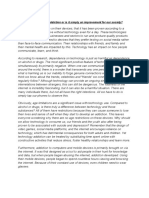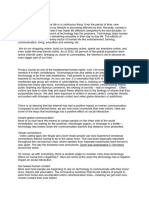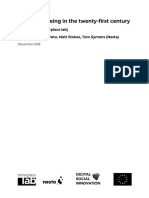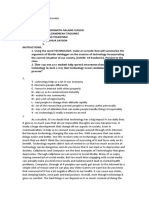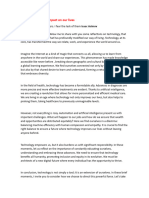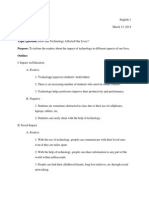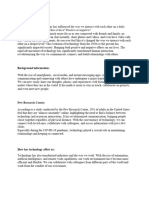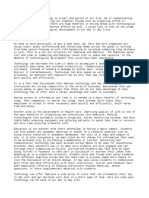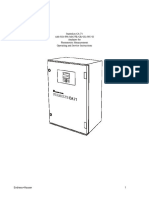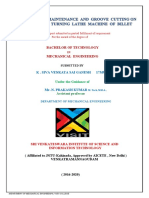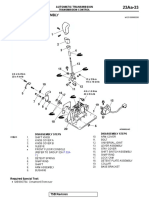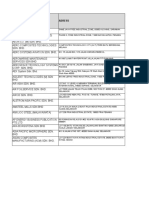Hello class, today we discuss about Albert Einstein once said, “It has become appallingly
obvious that our technology has exceeded our humanity.”(an interesting quote isn’t it?) What
does that mean for us,humans? Are we losing our grip on the things we built to make life easier,
or are we just adapting to it? We’re living in a time when tech is changing fast—AI is making
choices for us, like making our homeworks for school, making essays,and generating
pictures,etc. And in healthcare, some fantastic new technologies enable doctors to detect
disease far earlier and create new drugs/pills, saving countless lives each day.
Did you know over 4.5 billion people are online? That’s a huge digital community. Plus, tech has
provided education to tons of people, and even taken humans to space! Pretty cool, right? But
here’s the problem—tech is making human interaction feel less human. We text instead of talk.
We like posts instead of having real conversations. We might be in the same room but often feel
miles apart, glued to our screens. Social media, which is supposed to bring us together, can
actually make us feel lonelier. And AI? Sure, it can guess what we want before we ask, but can
it really understand human emotions? Drones can engage in combat without human presence,
but do they recognize the value of life? That said, tech isn’t all bad. It has its bright side too.
Life-saving vaccines, green energy, and instant communication show how tech can benefit us.
The focus shouldn’t be on whether technology is good or bad—it’s about how we use it. If we let
it take over, we might lose touch with what makes us human—our feelings, connections, and
compassion. So, what can we do about it? First, let’s set some limits with technology. Let’s chat
with people instead of just messaging them. Schedule time to meet face-to-face, put down our
devices, and really listen to each other. Education should also cover tech skills, but let’s not
forget about ethics, creativity, and critical thinking to help grow responsible digital citizens.
Einstein’s words are more than just a warning—they’re a challenge. Are we using technology to
create a better future, or are we letting it define us? If we make smart choices, tech can
enhance our humanity instead of replacing it. That’s a future we should aim for. Thanks for
listening to my speech for today!
The Good
Let’s start with the benefits that technology offers us. There is no question that we’re more
connected than ever before, which means that most of our family, friends, coworkers, and loved
ones are just a text, call, email, or video chat away. Stop and appreciate this for a moment! As
difficult as being apart, for any reason, can be, we can still talk in real time with those who
matter most.
That also means we don’t have to relinquish many of our routines, no matter what else is going
on in the world. Technology allows us to keep working, communicating, going to school,
shopping, going to doctor or therapy appointments, playing games, and staying aware of current
events.
And it allows us to do so with even more ease: Google’s product suite, for instance, can help you
write, format, present, calculate, collaborate, remind, and share all from one platform alone. The
resources available today have made it possible to easily learn, share, and create in a truly global
environment.
Technology allows students to watch lectures, participate in discussion groups, complete
assignments, and earn their degrees from the comfort of their own homes. Online learning
�platforms make it possible to skip the commute to campus, eliminate the need for exams by mail,
and improve efficiency.
The Bad
The benefits of technology are genuinely incredible, but there can be too much of a good thing.
Our hyperconnectivity means we may have difficulty disconnecting or creating space to unwind.
That can lead to feelings of stress or exhaustion and make it harder to truly relax when we need
that rest. If you could be working, studying, or catching up all the time, how do you know when
to stop? Creating boundaries and promoting mindfulness are critical for giving ourselves the
space and time our mental health deserves.
It's also important to be aware of the potential physical consequences from 24/7 connectivity.
Eyestrain, hand or wrist pain, and sleep deprivation are common symptoms when spending so
much time on our devices or in front of screens. Text neck, Blackberry thumb, and other overuse
injuries are becoming increasingly more prevalent, which means it is critical to give your body a
break and invest in your long-term health—particularly if you’re spending time on screens for
work, entertainment, and school.
Going to school in a digital environment can exacerbate these trends, putting students at added
risk for physical injuries even when it feels like a sedentary activity. Look for ways to optimize
your study time, which can help you ensure you’re getting the most out of your screen time. UA
Grantham offers a host of student support services, including tutoring, advising, and technology
help, that can help you avoid spending too much extra time in virtual spaces.
The Ugly
Unfortunately, there are even more severe risks out there when so much of our time is spent in
virtual spaces. The sense of anonymity we have online, or of feeling slightly removed from the
situation when behind a keyboard, can lead to saying things we wouldn’t ordinarily say in a face-
to-face situation. Coupled with the ability to share information in record time, this can quickly
create uncomfortable and even dangerous situations. It’s important to give yourself mindful
space away from virtual environments (and time to process painful feelings when they arise).
The spread of misinformation or outright lies, the prevalence of bullying and cyber attacks, and
other unpleasantries are all common side effects of our cyberspace—and they can lead to
anxiety, depression, addiction, and other mental health disorders. Social media alone has had a
dramatic impact on feelings of self-worth, success, and inclusion and belonging, and those
feelings carry into our real worlds. Be cautious about what you consume and avoid taking every
piece of information you see at face value.
The Balance
As they say, everything in moderation. There are some truly wonderful tools out there, and you
don’t have to delete your accounts or throw your computer out the window in order to have a
positive relationship with technology. All you really need is to set some healthy boundaries!
Try charging your phone outside the bedroom so it’s not the first thing you look at in the
morning. Practice turning off your devices during mealtimes or while exercising. Set time limits
for your computer, tablet, or TV. Turn off notifications on your mobile tech so you’re less likely
to pick it up as often. Create clear boundaries for when you plan to study and when it’s time to
take a break. Consider whether there are some analog tools that help you learn better than their
online counterparts, such as taking handwritten notes rather than typing them. Experiment and
see what works—and feels—best for you.
�Most importantly, check in with yourself regularly to see how you’re feeling. Take a moment to
ask yourself: Am I really benefiting from using this piece of technology? Am I using this tool
mindfully and how it was intended, or has it taken on a life of its own? Am I getting more out of
it than I’m spending—in time, money, or energy? If you’re getting your online degree at UA
Grantham, take advantage of your dedicated student advisor’s one-on-one support. They will
help you time manage your technology and focus to meet your personal goals.

